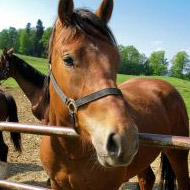
The British Equine Veterinary Association (BEVA) are urging vets to remain vigilant about Atypical Myopathy this spring, following the dramatic rise in cases last autumn.
Atypical Myopathy (AM) is a frequently fatal muscle disease that has become more prevalent in Great Britain in recent years. Indeed, last Autumn there were more that five times as many cases of AM than in the previous year, and experts have warned that the disease tends to occur more frequently in the spring following an autumn surge - possibly because of the growth of seedlings.
Horses that develop the disease are usually kept predominately on sparse pastures near sycamore or box elder trees that shed seeds containing the toxin hypoglycin A. Whilst these seeds may not be particularly appetising, horses on poor quality grazing may ingest large numbers of them.
Clinical signs of AM include laboured breathing, stiffness, dark red-brown urine, colic-like symptoms, recumbency or even sudden death. Often the disease will present itself as an outbreak. Diagnosis can be confirmed by a blood or urine test.
The BEVA have released preventative advice for horse owners which includes:
- Check spring pasture carefully for seeds prior to turnout
- Limit turnout if you are concerned about seed presence and ensure horses are well-fed prior to turnout
- Provide supplementary feeding in the field to reduce the risk of horses being tempted to ingest seeds
- Avoid leaving wet hay on the ground where it will rot
- Fence off affected areas
- Be aware that a field without sycamore trees can still contain seeds spread by high winds or flood water
Professor Celia Marr, a European specialist in equine internal medicine and editor of the Equine Veterinary Journal said: “New, collaborative research, instigated last year between the University of Liege, the Irish Equine Centre and the Animal Health Trust should shed more light on the characteristics of the disease in this country. Once we know more about the specific causes we should be able to make more positive progress with prevention strategies.”
Two articles on the disease have been provided by BEVA free of charge to vets to help the address the threat. They can be accessed via the following links:



 The veterinary mental health charity Vetlife is inviting the veterinary community to join it for a sponsored cold-water dip.
The veterinary mental health charity Vetlife is inviting the veterinary community to join it for a sponsored cold-water dip.